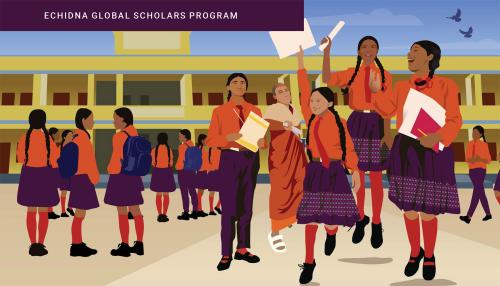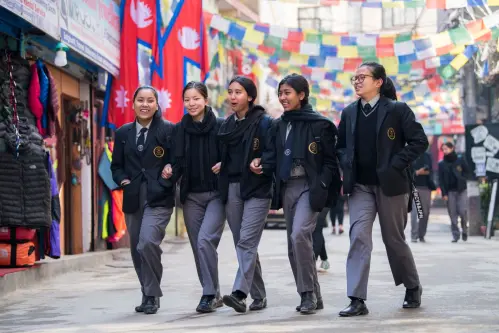Two innovative new deals launched in September: a development impact bond (DIB) for education outcomes at scale in India, and a social impact bond (SIB) for early childhood development in South Africa. These deals follow three years after the launch of Educate Girls, the first education impact bond in a developing country.
As a sector, education has lagged behind social welfare and employment, which account for the majority of the 118 impact bonds contracted to date around the world. These two new contracts bring the number of education impact bonds contracted globally to 11. Despite these modest beginnings, there is evidence of an emerging appetite for contracting on outcomes in education. This is evidenced by the development of two outcome funds for education—one in India, and the other in Africa and the Middle East—which aim to direct $1 billion each to driving up the quality of education in these regions.
India: Learning outcomes at scale
A diverse team of development actors joined together for the Quality Education India DIB, which launched in New Delhi earlier this month. This innovative financing mechanism has the potential to fund improved learning outcomes over four years for more than 300,000 primary school children in Gujarat and Delhi, making this the most ambitious education impact bond contracted to date.
While access to education in India has increased in recent years—with primary enrollment now topping 90 percent—achievement has lagged. According to the ASER Center’s 2016 report, only one in four third-graders in an average rural school in India are on track for their grade in reading and math. Impact bonds direct funding toward specific outcomes. In the Quality Education DIB, outcome funders (see Table 1) will pay only if learning outcomes improve.
Table 1: Quality Education India DIB
| Outcome metrics | Improvement in numeracy and literacy outcomes |
| Beneficiaries | Over 300,000 children |
| Upfront capital | $3 million |
| Outcome fund | $11 million |
| Maximum returns | 6% internal rate of return (IRR) |
| Outcome funder | The anchor outcome funder is the Michael and Susan Dell Foundation, and the British Asian Trust has convened other funders, including Tata Trusts, Comic Relief, the Mittal Foundation, and British Telecom |
| Additional funding | The UK Department for International Development (DFID) will provide performance management, legal, knowledge and learning, and outcomes evaluation |
| Investor | UBS Optimus Foundation |
| Service providers | Kaivalya Education Foundation (KEF) – a Piramal Initiative, Society for All Round Development (SARD), and Gyan Shala |
| Performance manager | Dalberg |
| Independent evaluator | Gray Matters India |
The total outcome fund is currently $11 million, but the goal is to double this amount in the coming years. Of this $11 million, 78 percent will be spent on service provision, 16 percent on management costs, and a maximum of 6 percent on the potential return to investors. The UBS Optimus Foundation is investing $3 million over the life of the DIB, and outcomes payments will be made at the end of each year if results are achieved, with the capital reinvested for the next year of services.
As the third development impact bond contracted in India, the Quality Education DIB will build on the experience of the recently completed Educate Girls DIB, which achieved 116 percent of its target for enrolling out-of-school girls, and 160 percent of its targets in learning outcomes in Math, English, and Hindi. Educate Girls will serve as a technical advisor but will not provide services in this new DIB.
With the experience gained from those involved in the Educate Girls impact bond, as well as the introduction of new perspectives from the broad coalition of actors, there is hope that this DIB will offer valuable lessons for the future of the field. In particular, one ambition is to create an education rate card, which would include a menu of prices for the achievement of particular goals that are based on the information gathered during this DIB to streamline the process of paying for outcomes.
South Africa: A focus on the early years
The South Africa Early Childhood Development (ECD) impact bond, known as the Impact Bond Innovation Fund (IBIF), is the second SIB contracted in South Africa, as well as the third impact bond globally with a government outcome funder in a low- or middle-income country (the first was for employment outcomes in Colombia). Although contracts for the SIB were signed in July 2018, service provision began last year, with the service provider bridging the funding until the financial agreements were finalized.
While children in South Africa qualify for a government subsidy for ECD if family income is below a certain threshold, this can only be applied toward registered ECD centers. This limits the children eligible for the subsidy, as many children do not attend registered centers. In the Western Cape province in 2015, 130,000 children aged 3-5, or 40 percent of that age group, did not attend an early learning group program. Without access to affordable early learning opportunities, many children, particularly from disadvantaged backgrounds, enter primary school unready to learn.
Table 2: South Africa ECD DIB
| Outcome metrics | See Table 3 below |
| Beneficiaries | More than 2,000 children ages 3-5 |
| Upfront capital | $0.65 million |
| Outcome fund | $1.76 million |
| Maximum returns | 16% IRR |
| Outcome funder | Department of Social Development and the ApexHi Charitable Trust |
| Investors | The Standard Bank Tutuwa Community Foundation, Futuregrowth Asset Management, and LGT Venture Philanthropy |
| Service provider | Western Cape Foundation for Community Work |
| Intermediary | Volta Capital is the financial intermediary, while mothers2mothers is the operational intermediary |
| Independent evaluator | Creative Consulting & Development Works |
| Technical support | The Bertha Centre for Social Innovation and Entrepreneurship at the University of Cape Town and Social Finance UK |
The SIB targets home visitation services to more than 2,000 children aged 3-5 in two of the poorest communities in the Western Cape province over the course of three years. The three investors (see Table 2) have provided upfront capital of R7.5 million ($0.65 million) for the program. The Department of Social Development and the ApexHi Charitable Trust will each contribute half of the outcome fund of R20.4 million ($1.76 million). Repayment will depend on recruitment, retention, and attendance, as well the Early Learning Outcomes Measure, an assessment tool (see Table 3).
Table 3: Outcome metrics
| Metric | Threshold | Measured |
| Recruitment and retention | Fee per beneficiary recruited and retained |
Every six months |
| Attendance | Fee per beneficiary attending >50% of program | Once a year from y2 onwards |
| Early Learning Outcomes Measure (ELOM) | Payment if score is >0.2 standard deviations higher than average for South African children of the same age and socioeconomic quintile |
Once a year from y2 onwards |
Brookings has closely followed the development of the impact bonds market in South Africa for several years, and first highlighted this deal in 2016, when the Departments of Social Development and Health of the Western Cape committed outcome funding for early childhood. Despite the early engagement of an outcome funder, the SIB took a further two years to close. The main hurdles in this process emerged from the fact that the deal differed to standard government contracting, as well as delays associated with the parallel health impact bond, which did not move past the design phase.
Conclusion
International actors will follow these impact bonds closely, in India to see if the success of the Educate Girls DIB can be replicated at scale, and in South Africa to observe the success of tying financing to early childhood outcomes in a developing country context. Here at Brookings, we are keen to learn how the stakeholders will engage with the government in both cases, and to observe the approaches to capacity building for the multiple service providers. Most importantly, we will continue to provide analysis and insight into the question of how outcome-based financing can support the achievement of quality education for all children.
Support for this blog post was generously provided by the British Asian Trust. The views expressed in this report are those of its authors and do not represent the views of the British Asian Trust, their officers, or employees.
The Brookings Institution is committed to quality, independence, and impact.
We are supported by a diverse array of funders. In line with our values and policies, each Brookings publication represents the sole views of its author(s).





Commentary
A landmark month for impact bonds in education
Two new initiatives focus spending on results
September 25, 2018